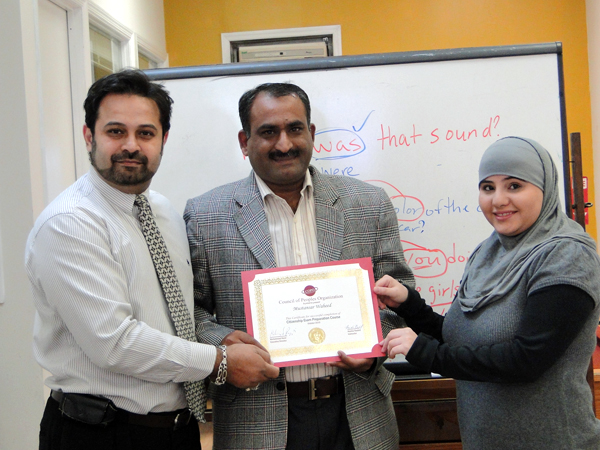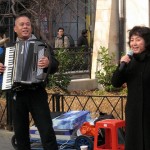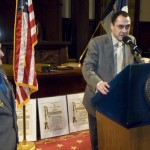
Mustansar Waheed proudly holds his certificate for passing a U.S. citizenship course. (Photo: Mohsin Zaheer)
NEW YORK—Mustansar Waheed, 35, bought a box of traditional Pakistani sweets and went directly to the office of Muhammad Razvi, executive director of the Council of Peoples Organization (COPO), a not-for-profit serving Pakistanis and other South Asian communities.
“I passed the English and civics test and I am a naturalized U.S. citizen now,” Mr. Waheed said proudly, as he gave the good news along with the box of sweets to Mr. Razvi. “All credit goes to you,” he added.
Mr. Waheed was sponsored by his wife to come to the U.S. as a legal resident in 2007. One of the happiest moments of his life was when he received a letter from U.S. Citizenship and Immigration Services (USCIS), asking him to appear before immigration officials on a specific date for his naturalization interview. But Mr. Waheed, a cab driver, was concerned too, because he did not know how he would pass the English test.
Naturalization is the process in which a person of a different nationality voluntarily becomes a U.S. citizen. During the naturalization interview, applicants not only answer questions about their background, they also must pass an English and civics test, unless they qualify for an exemption or waiver. The English test has three components: reading, writing, and speaking. The civics test covers important U.S. history and government topics.
After he received the letter from USCIS, Waheed went to a local Pakistani paralegal office on Brooklyn’s Coney Island Avenue, in an area known as ‘Little Pakistan,’ where he was referred to COPO and Mr. Razvi.
“Mr. Waheed showed me his letter and told me that he didn’t even know one word of English,” Mr. Razvi remembered. “I suggested he take English as Second Language (ESL) and during these 10 weeks of classes, we would prepare him for the U.S. Citizenship test.”
Mr. Waheed is one of the more than 55 million individuals in the U.S. who speak a language other than English at home. That number has been growing steadily for the past three decades, according to the Census Bureau.
Watch Mustansar Waheed and his teachers tell his story of passing the U.S. Citizenship test:
“When I evaluated Mr. Waheed, I found that he hardly had know-how with the English alphabet,” said Hasiba Rashid, a teacher at COPO. But he knew how to study.
“I took my classes, learned English and got myself prepared for the English and civics tests,” said Mr. Waheed. “And by the time I appeared before the immigration officer, I was more confident than nervous.”
Naturalization is the ultimate milestone on the long path toward U.S. citizenship. In 2008, a record number of people (1,046,539) were naturalized in the United States, according to a report from the Department of Homeland Security’s Office of Immigration Statistics.
“Mr. Waheed is one out of more than 300 immigrants to whom we taught English and prepared for the U.S. Citizenship test, but Waheed’s case is special as he scored 100 percent in his citizenship test,” said Mr. Razvi.
“I am so proud of Mr. Waheed, he is a perfect example of hard work and dedication,” said his teacher, Ms. Rashid.
USCIS recognizes and supports the role that organizations like COPO play in getting people like Waheed across the finish line of citizenship. As part of the Fiscal Year 2010 Department of Homeland Security Appropriations Act, Congress provided $11 million to enhance immigrant integration initiatives within USCIS. A significant portion of that money will bolster the Citizenship and Integration Grant Program that funds programs similar to the one COPO offers for South Asian immigrants in New York.
“ESL classes or U.S. citizenship classes are great opportunities, everyone in the community should know about it,” said Mr. Waheed. “If I can pass the citizenship test, everyone can do it.”
Mohsin Zaheer is the editor of Sada-e-Pakistan, an Urdu-language weekly in New York. His reporting for Feet in Two Worlds is supported by the New York Community Trust, the John S. and James L. Knight Foundation, and with additional support from the Mertz Gilmore Foundation.




